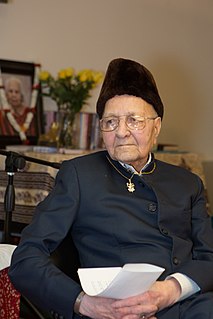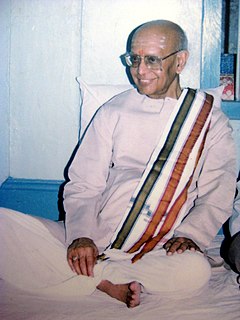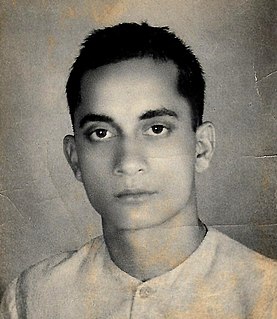Related Research Articles
Indian epic poetry is the epic poetry written in the Indian subcontinent, traditionally called Kavya. The Ramayana and the Mahabharata, which were originally composed in Sanskrit and later translated into many other Indian languages, and the Five Great Epics of Tamil literature and Sangam literature are some of the oldest surviving epic poems ever written.
Sahasranāma is a Sanskrit term which means "a thousand names". It is also a genre of stotra literature, usually found as a title of the text named after a deity, such as Vishnu Sahasranāma, wherein the deity is remembered by 1,000 names, attributes or epithets.

Telugu literature is the body of works written in the Telugu language. It consists of poems, short stories, novels, plays, and song lyrics, among others. There is some indication that Telugu literature dates at least to the middle of the first millennium, the first extant works are from the 11th century when the Mahabharata was first translated to Telugu from Sanskrit by Nannaya. The language experienced a golden age under the patronage of the Vijayanagara king-poet Krishnadevaraya.

Vachaspati Mishra was a ninth or tenth century Indian Hindu philosopher of the Advaita Vedanta tradition, who wrote bhashya (commentaries) on key texts of almost every 9th-century school of Hindu philosophy. He also wrote an independent treatise on grammar, Tattvabindu, or Drop of Truth, which focuses on Mīmāṃsā theories of sentence meaning.
The K.K. Birla Foundation was established in 1991 by Krishna Kumar Birla in Delhi. Its mission is to promote literature and the arts, as well as education and social work. It regularly gets mentioned in the media for the awards it confers, including:

Satya Vrat Shastri was an Indian Sanskrit scholar, writer, grammarian and poet. He wrote three Mahakavyas, three Khandakavyas, one Prabandhakavyas and one Patrakavya and five works in critical writing in Sanskrit. His important works are Ramakirtimahakavyam, Brahattaram Bharatam, Sribodhisattvacharitam, Vaidika Vyakarana, Sarmanyadesah Sutram Vibhati, and "Discovery of Sanskrit Treasures" in seven volumes.

Bhagirath Prasad Tripathi, better known as Vagish Shastri, was an Indian Sanskrit grammarian, linguist, tantra and yogi. In 2018, Government of India awarded him the fourth highest civilian award Padma Shri for his work in the field of literature and education.
Baldev Upadhyaya was a Hindi, Sanskrit scholar, literary historian, essayist and critic. He wrote numerous books, collections of essays and a historical outline of Sanskrit literature. He is noted for discussing Sanskrit literature in the Hindi language. Earlier books related to Sanskrit literature were often written either in Sanskrit or in English.

Gulab Khandelwal was an Indian poet who wrote poetry in different forms such as Lyrics, Sonnets, Rubais (Quatrains), Dohas (Couplets), Odes, Elegies, Lyrical Ballads, Epics, Poetic Dramas, Ghazals, and Masnavi with equal felicity. He even introduced some of these forms into Hindi literature and, apart from Hindi, has also written poetry in Urdu and English. The span of his poetic language touches upon Sanskrit on one end and Urdu on the other. Gulab Khandelwal died in Ohio on 2 July 2017.

Devarshi Kala Nath Shastry was born on 15 July 1936. He is a Sanskrit scholar honoured by the President of India in 1988. He is an Indologist and a prolific writer of Sanskrit, Hindi and English, and a well-known linguist, who has contributed to the campaign of evolving technical terminology in Indian languages and ensuring a respectable status to Hindi, the official language of his state and the Indian union.
Mahamahopadhyaya Pandit Ram Avatar Sharma (1877–1929) was an Indian Sanskrit scholar and academic, apart from being an indologist and historian. He was born in a Bhumihar Brahmin family of scholars and pursued the same path of scholarship, becoming the professor of Sanskrit in University of Patna in pre-independence years. He was also a renowned Indologist. Dr. Rajendra Prasad, the first President of India and a favourite student of Pandit Sharma, was instrumental in getting his works published after his death. His son, Professor Pandit Nalin Vilochan Sharma was also a professor of Hindi Literature in University of Patna and started the Nai Kavita; New Poetry movement in Hindi literature.

Vishwanathan Venkatachalam was an eminent Sanskrit scholar. He served as the vice-chancellor of Sampurnanand Sanskrit University, Varanasi, India for two terms. He was awarded the Padma Shri in 1989 by the Government of India for his valuable contribution to the field of Sanskrit research and education.

Rewa Prasad Dwivedi was a Sanskrit scholar, poet, writer, teacher, and critic. His original works include poetry as epics and lyrics, plays, and prose. He wrote new literature under the pseudonym "sanatana", meaning 'the eternal'. He is also known as 'Acharya' Dwivedi.
Abhiraj Rajendra Mishra is a Sanskrit author, poet, lyricist, playwright and a former Vice-Chancellor of the Sampurnanand Sanskrit University, Varanasi.
Bhaskaracharya Tripathi,, is a Sanskrit poet who was the recipient of the 2003 Sahitya Akademi Award for Sanskrit for his work Nirjharini.

This timeline lists important events relevant to the life of the Vaishnava (Hindu) spiritual leader, poet, commentator, educationist, religious and social figure Rambhadracharya.
A subhashita is a literary genre of Sanskrit epigrammatic poems and their message is an aphorism, maxim, advice, fact, truth, lesson or riddle. Su in Sanskrit means good; bhashita means spoken; which together literally means well spoken or eloquent saying.

Sribhashyam Vijayasarathi is an Indian author, Sanskrit grammarian, Philosopher and critic.
References
- ↑ "Prof. Ram Karan Sharma | Ananda Ashram". www.anandaashram.org. Retrieved 21 October 2020.
- ↑ "Manmohan announces Rs. 6,000 cr. for Assam". The Hindu. 17 January 2006.
- ↑ "Vachaspati Puraskar". The Hindu. 19 February 2005.
- 1 2 Gayatree Sharma (29 December 2008). "Sanskrit has never been dead". The Times of India . Archived from the original on 23 March 2012. Retrieved 2 March 2009.